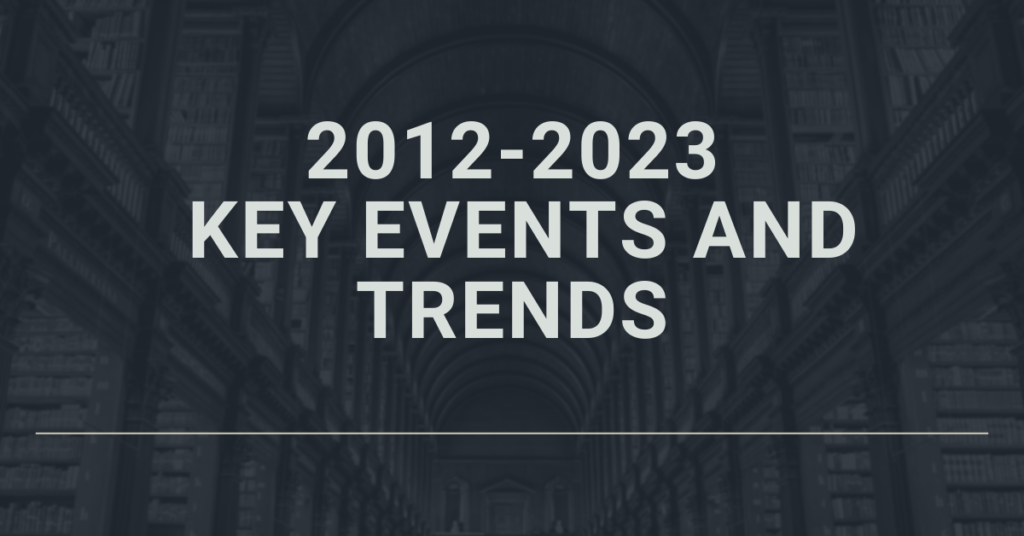The decade spanning from 2012 to 2023 has been one of rapid change and significant developments across various sectors. From technological advancements to political upheavals, environmental crises to cultural shifts, these years have shaped the world in profound ways. This comprehensive review will delve into the pivotal events and trends that defined this decade, exploring their impact and implications for the future.
Technological Advancements
The Rise of Artificial Intelligence
The period from 2012 to 2023 witnessed a monumental rise in artificial intelligence (AI). AI technologies, including machine learning, natural language processing, and computer vision, transitioned from theoretical concepts to practical applications that permeate everyday life.
- Healthcare: AI-driven diagnostic tools and personalized treatment plans revolutionized patient care. Systems like IBM’s Watson and Google’s DeepMind became instrumental in medical research and clinical practices, enhancing the accuracy of diagnoses and optimizing treatment protocols.
- Finance: AI reshaped the financial industry through algorithmic trading, risk management, and fraud detection. Fintech startups harnessed AI to provide personalized financial services, disrupting traditional banking models.
- Consumer Technology: The proliferation of virtual assistants such as Siri, Alexa, and Google Assistant transformed how individuals interact with technology. These AI-powered tools integrated seamlessly into smart homes, enhancing convenience and efficiency.
The Expansion of the Internet of Things (IoT)
The Internet of Things (IoT) saw exponential growth, connecting billions of devices and creating smart ecosystems in homes, cities, and industries.
- Smart Cities: IoT enabled the development of smart cities, where data-driven solutions improved urban living. Innovations in traffic management, energy conservation, and public safety optimized city infrastructure and enhanced residents’ quality of life.
- Smart Homes: IoT devices such as smart thermostats, security systems, and household appliances became common, providing homeowners with greater control and automation capabilities.
- Industrial IoT: Manufacturing and logistics industries adopted IoT to streamline operations, enhance predictive maintenance, and improve supply chain efficiency.
Renewable Energy Innovations
Renewable energy technologies advanced significantly, driven by a global push for sustainability and climate change mitigation.
- Solar and Wind Power: The cost of solar panels and wind turbines decreased, making renewable energy more accessible. Innovations in materials and energy storage improved efficiency and reliability.
- Battery Storage: Breakthroughs in battery technology, particularly lithium-ion and solid-state batteries, enabled better energy storage solutions, critical for the widespread adoption of renewable energy and electric vehicles.
- Electric Vehicles (EVs): The EV market expanded rapidly, with companies like Tesla, Nissan, and Chevrolet leading the way. Improved battery range and charging infrastructure contributed to the growing popularity of EVs.
Social and Political Changes
The Rise of Populism and Political Polarization
The decade (2023-2012) saw a surge in populist movements and increasing political polarization across various countries, reshaping the political landscape.
- United States: The election of Donald Trump in 2016 epitomized the rise of populism, with his administration’s policies and rhetoric reflecting a departure from traditional political norms. The 2020 election of Joe Biden highlighted deep political divides and the challenges of governance in a polarized society.
- Europe: Populist parties gained traction in countries like Italy, Hungary, and Poland, advocating for nationalist policies and challenging the European Union’s cohesion. The UK’s Brexit decision in 2016 further exemplified this trend.
- Global Impact: Populism influenced politics worldwide, with leaders in Brazil, India, and the Philippines embracing populist strategies, leading to significant shifts in domestic and foreign policies.
Also Read: 2023-1954: A JOURNEY THROUGH TIME
Social Movements and Advocacy
This decade was marked by powerful social movements advocating for change and raising awareness about critical issues.
- #MeToo Movement: Starting in 2017, the #MeToo movement highlighted the prevalence of sexual harassment and assault, leading to widespread societal and workplace changes.
- Black Lives Matter: The Black Lives Matter movement, sparked by incidents of police brutality, called for racial justice and police reform. Protests and advocacy led to significant policy discussions and changes.
- Climate Activism: Young activists like Greta Thunberg galvanized global climate strikes, urging governments and corporations to take more aggressive action against climate change.
Global Health Challenges
The world faced (2023-2012) unprecedented health challenges, with the COVID-19 pandemic being the most significant.
- COVID-19 Pandemic: Emerging in late 2019, the pandemic had a profound impact on global health, economies, and daily life. The rapid development and distribution of vaccines, particularly mRNA vaccines, were significant scientific achievements.
- Mental Health Awareness: The pandemic highlighted the importance of mental health, leading to increased awareness and support for mental health issues.
Environmental Awareness and Action
Climate Change and Extreme Weather
The impacts of climate change became more pronounced, with an increase in extreme weather events.
- Heatwaves and Wildfires: Record-breaking heatwaves and devastating wildfires affected regions worldwide, from Australia to California, highlighting the urgent need for climate action.
- Hurricanes and Floods: Intense hurricanes and flooding events, such as those caused by Hurricane Harvey and Typhoon Haiyan, underscored the need for improved disaster preparedness and climate resilience.
- Global Temperature Rise: The decade saw consistent increases in global temperatures, prompting urgent calls for reducing greenhouse gas emissions.
International Climate Agreements
Efforts to combat climate change included significant international agreements and initiatives.
- Paris Agreement: Adopted in 2015, the Paris Agreement aimed to limit global warming to below 2 degrees Celsius above pre-industrial levels. Countries committed to reducing emissions and enhancing climate resilience.
- COP Summits: Annual Conferences of the Parties (COP) brought nations together to negotiate climate action, with notable progress and challenges in achieving global targets.
Corporate Sustainability Initiatives
Businesses increasingly recognized the importance of sustainability and corporate social responsibility.
- ESG Investing: Environmental, Social, and Governance (ESG) criteria became integral to investment decisions, encouraging companies to adopt sustainable practices.
- Corporate Commitments: Major corporations pledged to achieve net-zero emissions, reduce plastic waste, and adopt renewable energy sources, driving industry-wide change.
Cultural Shifts
Digital Entertainment and Media
The way people consumed entertainment and media transformed significantly, with streaming services and digital content becoming dominant.
- Streaming Services: Platforms like Netflix, Hulu, Disney+, and Amazon Prime revolutionized how audiences consumed movies and TV shows, offering on-demand access to vast libraries of content.
- Social Media Influence: Social media platforms like Instagram, TikTok, and YouTube became powerful cultural influencers, shaping trends, and launching careers for content creators and influencers.
The Evolution of Work
The nature of work underwent significant changes, driven by technology and evolving societal expectations.
- Remote Work: The COVID-19 pandemic accelerated the adoption of remote work, with companies embracing flexible work arrangements and investing in digital collaboration tools.
- Gig Economy: The gig economy expanded, with platforms like Uber, Lyft, and Fiverr providing flexible work opportunities and redefining traditional employment models.
- Work-Life Balance: There was a growing emphasis on work-life balance and employee well-being, with companies offering wellness programs, mental health support, and flexible hours.
Shifts in Consumer Behavior
Consumer behavior evolved, driven by technological advancements and changing values.
- E-Commerce Boom: Online shopping became increasingly popular, with companies like Amazon, Alibaba, and Shopify capitalizing on the trend and transforming the retail landscape.
- Sustainable Consumption: Consumers became more conscious of their environmental impact, favoring sustainable and ethically produced goods. Brands responded by adopting eco-friendly practices and transparent supply chains.
- Health and Wellness: There was a growing focus on health and wellness, with consumers prioritizing fitness, nutrition, and mental well-being. This trend spurred growth in the fitness industry, health food markets, and wellness apps.
Scientific Breakthroughs
Advances in Biotechnology
Biotechnology saw remarkable progress, with breakthroughs in gene editing, personalized medicine, and synthetic biology.
- CRISPR-Cas9: The development of CRISPR-Cas9 gene-editing technology revolutionized genetic research, offering potential cures for genetic disorders and advancements in agriculture and biotechnology.
- Personalized Medicine: Advances in genomics and data analytics enabled personalized medicine, tailoring treatments to individual genetic profiles for more effective healthcare.
- Synthetic Biology: Synthetic biology emerged as a promising field, with applications in medicine, agriculture, and environmental sustainability, including the development of biofuels and biodegradable materials.
Space Exploration and Discoveries
Space exploration entered a new era, marked by significant achievements and discoveries.
- Mars Missions: NASA’s Perseverance rover and China’s Tianwen-1 mission successfully landed on Mars, conducting experiments and searching for signs of past life.
- Commercial Space Travel: Companies like SpaceX and Blue Origin made strides in commercial space travel, with successful launches and plans for future manned missions.
- Exoplanet Discoveries: Advances in telescopes and space observatories, such as the James Webb Space Telescope, led to the discovery of numerous exoplanets, expanding our understanding of the universe.
Medical Advancements
The decade (2023-2012) witnessed groundbreaking medical advancements, improving healthcare and saving lives.
- Vaccine Development: The rapid development of COVID-19 vaccines, particularly mRNA vaccines by Pfizer-BioNTech and Moderna, demonstrated the potential of new vaccine technologies.
- Cancer Treatments: Immunotherapy and targeted therapies emerged as effective cancer treatments, offering new hope for patients with previously untreatable cancers.
- Telemedicine: The adoption of telemedicine surged, providing remote healthcare access and improving patient outcomes, especially during the COVID-19 pandemic.
Conclusion
The decade from 2012 to 2023 was marked by significant advancements, challenges, and transformations across various domains. Technological innovations reshaped industries and daily life, social and political changes influenced global dynamics, and a heightened awareness of environmental issues prompted action on multiple fronts. As we move forward, the lessons and developments of this decade will continue to shape our world, driving progress and inspiring future generations to address the challenges and opportunities that lie ahead. The period from 2012 to 2023 will be remembered as a time of profound change, laying the foundation for a more interconnected, sustainable, and innovative future.







